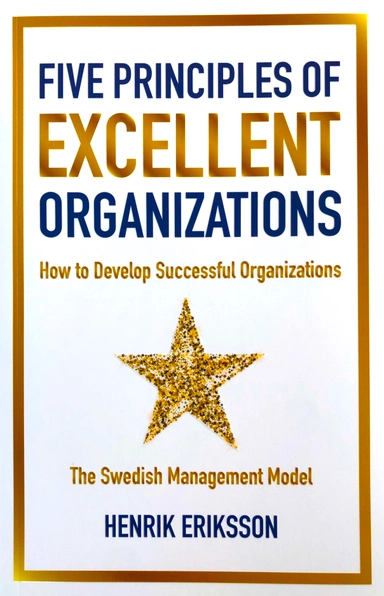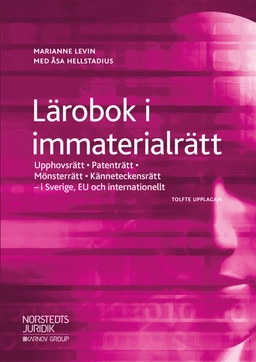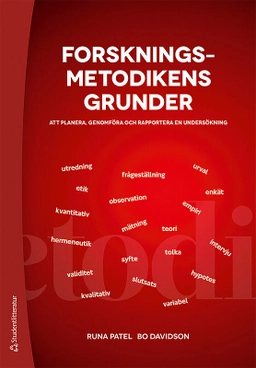What are the characteristics of excellent organizations? How do the best organizations manage to have satisfied customers, satisfied employees, and at the same time achieve fantastic results?
In the book Five Principles of Excellent Organizations, these organizations are decoded through twenty years of research. A way of working and thinking appear to exist in all successful organizations, regardless of the type of organization.Many organizations are not as good as they could be. But we can develop them. This book describes how that can be done.
Based on a solid and unique foundation of experience and research, the book provides clear answers to what characterises excellent organizations. It is like reading Good to Great in a different context. The book gives clear examples from some of the finest companies and from several different industries. The model with the five principles shows a clear direction for the companies that set out on the journey with the aim of becoming one of the best. Dag Kroslid, CEO, NorDan
It is rare to read a book that contains so many facts and so much knowledge on the subject. It is evident that Henrik Eriksson has experienced what is described in the book. This book gives concrete and clear advice on how to succeed with your development work. I myself am not particularly fond of all new management theories that are supposed to save us managers, and I get happy when it is described that it is quite clear what needs to be in place in order to succeed. I got many thoughts and ideas myself. I will read the book again. Tomas Fellbrandt, Director of Municipal Administration, Municipality of Skövde
The book describes in a very accurate way both the traps that organizations often fall into, but also the big breakthroughs that can be achieved with a clear why and through continuous improvements. The book is hard to put away once you have started reading. Here is a lot of inspiration for those who want to make organizations better. Katarina Lindström, Executive Vice President & Chief Operating Officer, Hempel
Simple and concrete advice to anyone who wants to work on improving their organization. The book describes in a liberating way, far from all different concepts and management theories, how concrete improvements have been successfully achieved by working to create the greatest possible value for those we exist for. The fact that it is based on a broad and thorough research as well as on the described organizations’ improvement journeys makes it practically applicable for different organizations. Finally, a book that is not about yet another new theory of improvement with new names and concepts, but instead focuses on what has worked in practice and compiled this. Ann Söderström, Director of Healthcare, Region Västra Götaland
I have been convinced for a long time that companies have an important role in making the world better. We are now in the middle of a transition where the purpose of entrepreneurship goes from being driven by profit to driven by need and purpose. However, a personal conviction does not always have to be evidence-based, which is why it is exciting and gratifying to see that 20 years of research on excellent organizations shows such a strong connection. It is time to learn more and Five Principles of Excellent Organizations feels like an obvious step along the road! Stefan Krook, Co-founder, Kivra
Henrik Eriksson has in a simple way described the importance of the different principles for success and the importance of working with all principles at the same time if you want to succeed. Many good examples show that the principles are useful in all industries. The book provides a good base for the fun work of creating a sustainable and constantly developing organization. All leaders should read the book! Lena Lundh, Vice President, Lean Forum
Success is not a coincidence. Success is not luck. A company does not just become good. Many parts are required in order to be good in the long term. In the book Five Principles of Excellent Organizations, you can read about many experiences and advices. It is well worth reading! To familiarise yourself with successful organizations, and later daring to try and make your own experience, can create real success. Marcus Strömberg, CEO, AcadeMedia
The book Five Principles of Excellent Organizations highlights, in a positive way and with concrete examples, what success factors several leading organizations have in common. With the support of a scientific foundation, good advice is given on what to think about when building the best of organizations. It can advantageously be used as a tool to analyse your own organization and get started on systematic quality work. Anki Bäck, Principal, Byle School
For more than 25 years, SIQ - the Swedish Institute for Quality - has evaluated organizations and awarded fine examples of organizational development with the Swedish Quality Award. These award recipients proved suitable to study in order to understand how successful organizations work and constantly improve. In Five Principles of Excellent Organizations, the researcher and author Henrik Eriksson decodes the principles behind the success. Combined with 20 years of research experience, very simple tips and advices are given on how more organizations can be better. The book is very easy to pick up and the potential for improvement in organizations is huge, read it and start improving! Mats Deleryd, CEO, SIQ - the Swedish Institute for Quality
Concrete, research-based advice for those who want to develop an organization towards a success that is not only measured in financial profit. The perfect guide to anyone who wants to lead an organization that is good for those the organization exists for. Helene Mellström, Director/CEO, Bräcke Diakoni
The technological development has created new opportunities and increased competition for both customers and companies. Based on his and his colleagues’ research, Henrik Eriksson describes in Five Principles of Excellent Organizations how our most successful organizations work. The book is written with easily accessible language and is rich in examples and quotations, which together with references makes it a great source of inspiration suitable for managers and everyone else interested in modern quality management. Bengt Klefsjö, Professor Emeritus, Quality Management, Luleå University of Technology
Henrik Eriksson, PhD, is a professor at Chalmers University of Technology, and consultant and lecturer at Förbättringsakademin.
Åtkomstkoder och digitalt tilläggsmaterial garanteras inte med begagnade böcker





















